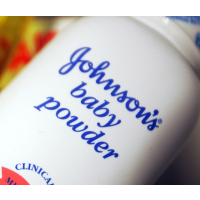Third Jury Says Johnson & Johnson’s Baby Powder Causes Cancer; 2,000 More Lawsuits to Go
 (photo: Chris Hondros, Getty Images)
(photo: Chris Hondros, Getty Images)
By Linda A. Johnson, AP Medical Writer
TRENTON, N.J. (AP) — For the third time, Johnson & Johnson has been hit with a multimillion-dollar jury verdict over whether the talc in its iconic baby powder causes ovarian cancer when applied regularly for feminine hygiene.
Late Thursday, a St. Louis jury awarded $70.1 million to Deborah Giannecchini of Modesto, California, who was diagnosed with advanced ovarian cancer in 2012. Giannecchini, then 59, said she had used Johnson's Baby Powder for more than 40 years to keep her genital area dry, as many women do. She blamed it for her cancer and accused J&J of negligence.
Two other jury trials in St. Louis reached similar outcomes earlier this year, awarding the plaintiffs $72 million and $55 million.
But in J&J's home state of New Jersey a judge recently threw out two other cases, ruling there wasn't reliable evidence talc causes ovarian cancer, a relatively rare disease.
Johnson & Johnson says its product is safe, and it is appealing all three losses. And investors don't seem worried that J&J is in financial trouble, even though the company faces an estimated 2,000 similar lawsuits. J&J shares fell 0.3 percent Friday, about the same as the broader stock market, to close at $115.33.
The next trial is set to start in January, also in St. Louis.
Here's what experts say about talc and cancer.
WHAT IS TALC?
Talc is a mineral that is mined from deposits around the world, including the U.S. The softest of minerals, it's crushed into a white powder. It's been widely used in cosmetics and other personal care products to absorb moisture since at least 1894, when Johnson & Johnson's Baby Powder was launched. But it's mainly used in a variety of other products, including paint and plastics.
DOES IT CAUSE OVARIAN CANCER?
Like many questions in science, there's no definitive answer. Finding the cause of cancer is difficult. It would be unethical to do the best kind of study, asking a group of women to use talcum powder on their genitals and wait to see if it causes cancer, while comparing them to a group who didn't use it.
While ovarian cancer is often fatal, it's relatively rare. It accounts for only about 22,000 of the 1.7 million new cases of cancer expected to be diagnosed in the United States this year.
Factors that are known to increase a women's risk of ovarian cancer include age, obesity, use of estrogen therapy after menopause, not having any children, certain genetic mutations and personal or family history of breast or ovarian cancer.
WHAT RESEARCH SHOWS
The biggest studies have found no link between talcum powder applied to the genitals and ovarian cancer. But about two dozen smaller studies over three decades have mostly found a modest connection — a 20 percent to 40 percent increased risk among talc users.
However, that doesn't mean talc causes cancer. Several factors make that unlikely, and there's no proof talc, which doesn't interact with chemicals or cells, can travel up the reproductive tract, enter the ovaries and then trigger cancer.
One large study published in June that followed 51,000 sisters of breast cancer patients found genital talc users had a reduced risk of ovarian cancer, 27 percent lower than in nonusers. An analysis of two huge, long-running U.S. studies, the Women's Health Initiative and the Nurses' Health Study, showed no increased risk of ovarian cancer in talc users.
WHAT EXPERTS SAY
If there were a true link, Dr. Hal C. Lawrence III says large studies that tracked women's health for years would have verified results of the smaller ones.
"Lord knows, with the amount of powder that's been applied to babies' bottoms, we would've seen something," if talc caused cancer, said Lawrence, vice president of the American College of Obstetrics and Gynecology.
The National Cancer Institute's Dr. Nicolas Wentzensen says the federal agency's position is that there's not a clear connection.
"It is very hard to establish causal relationships," he said, adding, "A lot of ovarian cancers occur in women who have never used talc, and many women have used talc and not gotten ovarian cancer."
Research director Elizabeth Ward of the American Cancer Society says it is unusual to have so much discrepancy between studies. "The risk for any individual woman, if there is one, is probably very small," Ward said.
- Top Stories
- Unusual News
- Where is the Money Going?
- Controversies
- U.S. and the World
- Appointments and Resignations
- Latest News
- Trump Orders ICE and Border Patrol to Kill More Protestors
- Trump Renames National Football League National Trump League
- Trump to Stop Deportations If…
- Trump Denounces World Series
- What If China Invaded the United States?






Comments